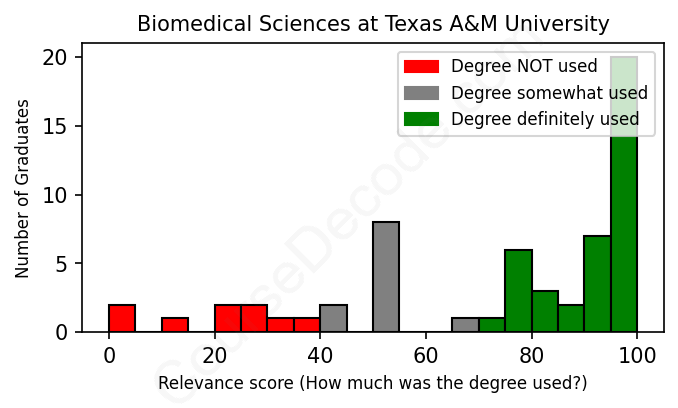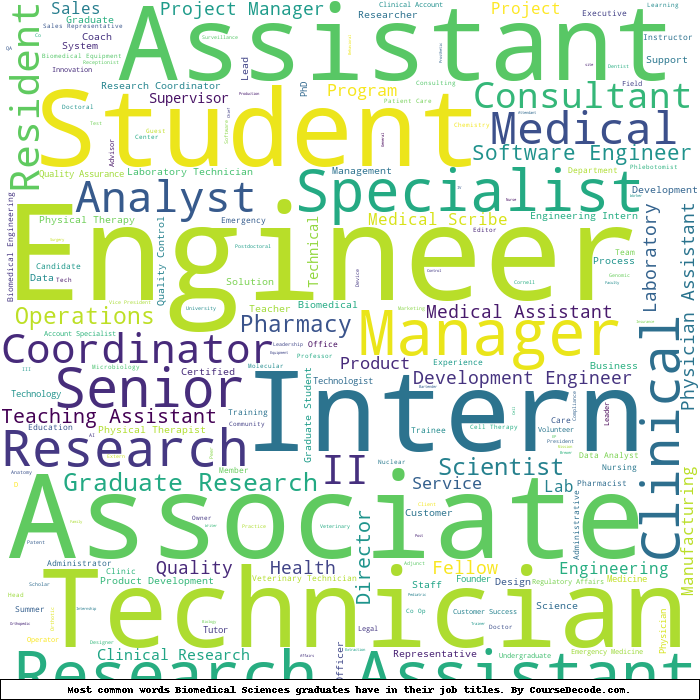
First, some facts. Of the Biomedical Sciences graduates from Texas A&M University we've analyzed , here's how many have used (or NOT used) their degree in their career:

These are estimates based on AI analysis of 59 LinkedIn profiles (see below).
The verdict? Above average. Overall, with an average relevance score of 73%, Biomedical Sciences graduates from Texas A&M University have a higher likelihood (+6%) of finding work in this field compared to the average graduate across all fields:
And for comparison, here's the chart for all profiles we've looked at across all degrees.
Also, after graduating, 55% of these graduates have pursued further education other than another Bachelor's degree (such as a Masters degree or other), compared to the average across all profiles of 35%. This suggests you may need more than just a Bachelors degree to be competitive as a Biomedical Sciences graduate.
See the details:
|
Relevance score: 20% We think this person has NOT gone into a career related to their degree. We think this person has NOT gone into a career related to their degree.
DEGREE INFOGraduated in 2012 from Texas A&M University with a Bachelor of Science (B.S.) in Biomedical Sciences. Also pursued further education since (see below). JOB HISTORY SINCE GRADUATIONNon-profit Project Management Intern NTLP - Not Typical Library Partners Dec 2012 - Jul 2013 Personal Banker and Loan Administrator  Northstar Bank of Texas Aug 2013 - Feb 2017 Customer Service and Support Representative  Southwest Airlines Feb 2017 - May 2018 Coordinator  Southwest Airlines May 2018 - Jan 2020 Stylist  Stitch Fix Aug 2020 - Jul 2023 CEO | Consultant  Replanted LLC Aug 2019 - Present Data Programmer Analyst  Tarrant County College Jun 2023 - Present FURTHER DEGREES DONE SINCE GRADUATINGMasters DegreeTarleton State University 2015 - 2019 ABOUTCollectively we have an obligation to continue moving forward. However, moving forward does not mean leaving some behind. The human factor of business must hold the same weight as it holds in everyday life. We need each other to move forward, in work and in life. Each person, being a machine, rather than a cog, is the essence of humanity. Each person brings value, perspective, knowledge, experience, and heart that is needed and unique. People aren't just a part, they are the drive and the force behind everything. |
The top 10 most common jobs done by the graduates we've analyzed (ranked most common to least) are:
When analyzing the career paths of Texas A&M University Biomedical Sciences graduates, it becomes clear that many of them have gravitated towards roles in healthcare and medical practice. A substantial number have found positions as physicians, physician assistants, or medical doctors. These roles are highly relevant to their degree because they rely heavily on the knowledge and skills gained during their studies. For instance, being a medical doctor or a resident physician involves daily application of a deep understanding of biological systems, diseases, and patient care, which aligns perfectly with the curriculum of Biomedical Sciences. Many graduates also served as physician assistants, and they too utilize their biomedical training to provide high-quality patient care and clinical assessments.
On the other hand, not all graduates directly translated their Biomedical Sciences education into roles deeply rooted in the biomedical field. A significant number of alumni ended up in positions such as administrative roles, project management, or various non-clinical jobs, where the connection to biomedical knowledge is much weaker. For example, roles like project coordinators, customer service representatives, or banking positions offer little to no relevance to the core principles of Biomedical Sciences. While these jobs might utilize some transferable skills, they largely do not apply the specialized knowledge gained during their education. Interestingly, some graduates even entered fields like education or business consulting, where knowledge from Biomedical Sciences is only tangentially relevant.
Lastly, fields like research and development also attracted some graduates, especially in roles like research associates or lab technicians. These jobs can definitely utilize the scientific approach and analytical thinking that come from a Biomedical Sciences background. Other positions, however, like those involving significant business management or operations strategy, may use some of the analytical skills but fall short of fully utilizing the biomedical expertise that the degree provides. Overall, while many graduates found fulfilling positions that directly relate to their field of study, a noteworthy number took paths that strayed far from their Biomedical Sciences foundation. This indicates a diverse range of career opportunities, although the relevance of their education varies greatly across different roles.
Here is a visual representation of the most common words in job titles for Biomedical Sciences graduates (this is across all Biomedical Sciences graduates we've analyzed, not just those who went to Texas A&M University):

Looking at the career trajectories of Texas A&M University graduates with a degree in Biomedical Sciences, it's clear that this program often leads students to a variety of paths in the medical and research fields. Right after graduation, many graduates land positions that are either directly related to healthcare or serve as stepping stones into advanced medical training. For example, several graduates started as medical assistants, research assistants, or in technician roles which are common entry-level jobs that help build the necessary experience for future roles in healthcare.
As we look at where these graduates end up five or ten years down the road, it's evident that a significant number pursue advanced degrees or certifications to become more specialized in their fields. Many of those who became physician assistants, nurse practitioners, or physicians continue in those careers with some even climbing to leadership roles or engaging in specialized practices. There’s also a noticeable group who remains within research and development, working in labs or for innovative companies focused on biomedical technology. This trend suggests that graduates from this program are not only finding relevant positions but are also successfully advancing in their careers, making impactful contributions to healthcare and research.
That said, not every graduate’s career aligns perfectly with their Biomedical Sciences education. A portion of the class ends up in roles that are more administrative, managerial, or completely detached from the biomedical field, such as those who become teachers or work in completely unrelated industries like banking and customer service. While this might not be indicative of failure, it does reflect that some graduates may struggle to find a perfect match for their skills and interests in the biomedical realm immediately after graduation. Nevertheless, the overall view is quite positive, with many graduates establishing strong, relevant careers in healthcare and life sciences.
Getting a Bachelor’s degree in Biomedical Sciences at Texas A&M can be pretty challenging, but it really depends on your interest and study habits. The coursework often dives deep into complex topics like biology, chemistry, and anatomy, which can be a lot of information to handle. It’s not necessarily the hardest degree out there, but it's definitely more demanding than some other majors because of the heavy science focus. If you enjoy science and are willing to put in the effort, you’ll likely find it manageable, but be prepared for some late nights and tough exams along the way!
Most commonly, in the LinkedIn profiles we've looked at, it takes people 4 years to finish a Bachelor degree in Biomedical Sciences.
Looking at the job paths of these Biomedical Sciences graduates from Texas A&M University, it's clear that many of them have pursued careers that generally pay well. Those who moved into fields such as medicine or physician assistant roles tend to earn substantial salaries, especially highlighted by the medical professionals who start as residents and then progress into higher-paying roles like attending physicians. For instance, the 2013 grad currently serving as a neurosurgery resident will likely see a significant salary leap once they complete their training. Similarly, the graduates who’ve transitioned into roles like Product Development Manager or Director of Research and Development are also likely enjoying competitive pay in their respective fields.
However, not every graduate from this list is in a high-earning job. Some have taken on roles that might not pay as well initially, like customer service or administrative assistant positions. For example, the 2018 grad working as a Special Education Paraprofessional or a legal assistant likely earns less than their healthcare counterparts. It just goes to show that while a degree in Biomedical Sciences can open doors to lucrative careers in medicine and biotech, the individual career path can vary quite a bit, and not everyone might be cashing in just yet. Overall, there’s a lot of potential for decent earnings, particularly for those who stick with healthcare or advanced research positions.
Here is a visual representation of the most common words seen in the "about" section of LinkedIn profiles who have a Bachelor degree in Biomedical Sciences (this is across all Biomedical Sciences graduates we've analyzed, not just those who went to Texas A&M University). This may or may not be useful:

Here are all colleges offering a Bachelor degree in Biomedical Sciences (ordered by the average relevance score of their Biomedical Sciences graduates, best to worst) where we have analyzed at least 10 of their graduates:
| College | Score | Count |
|---|---|---|
 Western Michigan University Western Michigan University
|
81 | 17 |
 Marquette University Marquette University
|
78 | 29 |
 University of Michigan University of Michigan
|
77 | 10 |
 Colorado State University Colorado State University
|
77 | 19 |
 University at Buffalo University at Buffalo
|
75 | 18 |
 California Polytechnic State University-San Luis Obispo California Polytechnic State University-San Luis Obispo
|
74 | 13 |
 University of Connecticut University of Connecticut
|
74 | 15 |
 Texas A&M University Texas A&M University
|
73 | 59 |
 Auburn University Auburn University
|
71 | 26 |
 Northern Arizona University Northern Arizona University
|
71 | 15 |
 Rensselaer Polytechnic Institute Rensselaer Polytechnic Institute
|
70 | 10 |
 University of Central Florida University of Central Florida
|
69 | 26 |
 University of South Florida University of South Florida
|
68 | 48 |
 Georgia Institute of Technology Georgia Institute of Technology
|
67 | 41 |
 The Ohio State University The Ohio State University
|
64 | 14 |
 Rochester Institute of Technology Rochester Institute of Technology
|
64 | 12 |
 Case Western Reserve University Case Western Reserve University
|
63 | 12 |
 Grand Valley State University Grand Valley State University
|
59 | 35 |
 Arizona State University Arizona State University
|
58 | 12 |